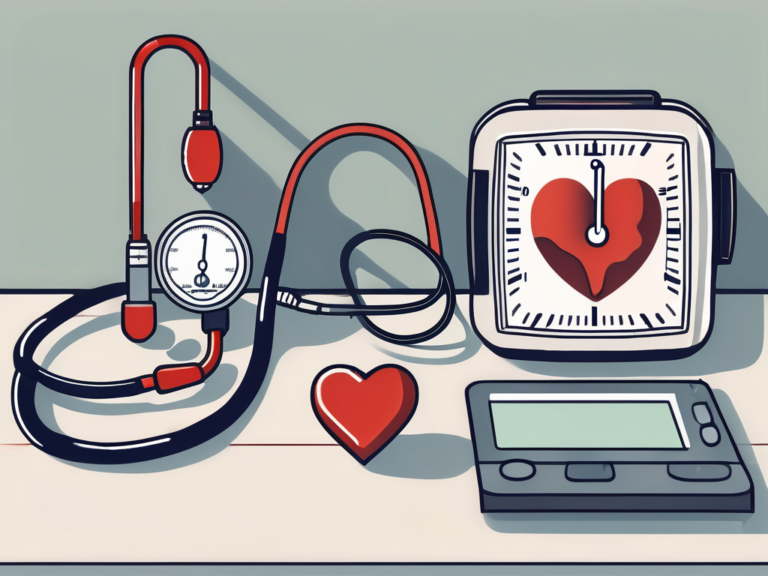Heart, Home and vasovagal
Vasovagal syncope is a common condition that can cause episodes of fainting or loss of consciousness. Although it can be a frightening experience, understanding the underlying mechanisms and triggers can help individuals manage this condition and live a fulfilling life. In this article, we will explore the various aspects of vasovagal syncope, from its definition to its management strategies. So, let’s dive in and explore the intricate relationship between the heart, the home, and vasovagal syncope.
Understanding Vasovagal Syncope
Vasovagal syncope, also known as neurocardiogenic syncope or reflex syncope, occurs when there is a sudden drop in blood pressure leading to a temporary lack of blood flow to the brain. This results in the individual fainting. While the exact cause of vasovagal syncope is not fully understood, it is believed to be triggered by a combination of factors, including the activation of the autonomic nervous system and the heart’s response to certain stimuli.
When an individual experiences vasovagal syncope, it can be a frightening and disorienting experience. The sudden loss of consciousness can occur without warning, leaving the person feeling weak and confused upon regaining consciousness. It is essential for individuals with vasovagal syncope to be aware of their triggers and take necessary precautions to prevent episodes.
What is Vasovagal Syncope?
Vasovagal syncope is a form of fainting that is typically triggered by specific stimuli, such as emotional stress, pain, prolonged standing, or exposure to heat. These triggers cause the autonomic nervous system to overreact, resulting in a sudden drop in blood pressure and a slower heart rate. This response restricts blood flow to the brain, leading to fainting.
Individuals with vasovagal syncope may also experience symptoms such as dizziness, nausea, and sweating before fainting. These warning signs can provide an opportunity to sit or lie down to prevent injury from falling during a syncopal episode. It is crucial for individuals with vasovagal syncope to communicate their condition to healthcare providers, family members, and colleagues to ensure a safe environment and prompt assistance if needed.
Common Triggers of Vasovagal Syncope
There are several triggers that individuals with vasovagal syncope commonly experience. Emotional stress, such as anxiety or fear, can activate the body’s fight-or-flight response, leading to a sudden drop in blood pressure. Painful or uncomfortable medical procedures, such as blood draws or injections, can also trigger vasovagal syncope. Prolonged standing or being in a hot and crowded environment can further exacerbate the condition. Understanding these common triggers can help individuals manage their condition effectively.
Furthermore, certain medications, dehydration, and underlying medical conditions such as heart problems or neurological disorders can increase the risk of vasovagal syncope. It is important for individuals with this condition to work closely with healthcare providers to identify potential triggers and develop a comprehensive management plan. By taking proactive measures and making lifestyle adjustments, individuals with vasovagal syncope can minimize the frequency and severity of syncopal episodes.
The Heart’s Role in Vasovagal Syncope
The heart plays a crucial role in vasovagal syncope, as it is responsible for pumping blood throughout the body. The autonomic nervous system, which regulates various bodily functions, including heart rate and blood pressure, is closely intertwined with the heart’s functioning. Let’s delve deeper into the heart’s involvement in vasovagal syncope.
Vasovagal syncope, also known as neurocardiogenic syncope, is a common cause of fainting episodes. It occurs when there is a sudden drop in blood pressure and heart rate, leading to a temporary loss of consciousness. Understanding the intricate connection between the heart and the autonomic nervous system is essential in managing vasovagal syncope effectively.
The Autonomic Nervous System and the Heart
The autonomic nervous system is composed of the sympathetic and parasympathetic branches, each responsible for different bodily functions. In individuals with vasovagal syncope, the parasympathetic branch, known as the rest-and-digest response, overpowers the sympathetic branch, leading to a drop in blood pressure and heart rate. This imbalance in autonomic control can contribute to the onset of vasovagal syncope episodes.
Moreover, the vagus nerve, a key player in the parasympathetic nervous system, plays a significant role in vasovagal syncope. When stimulated, the vagus nerve can cause a sudden decrease in heart rate and blood pressure, triggering a fainting episode. Understanding the vagus nerve’s impact on heart function is crucial in comprehending the underlying mechanisms of vasovagal syncope.
Heart Rate Variability and Vasovagal Syncope
Heart rate variability refers to the natural variation in the time interval between consecutive heartbeats. Research suggests that individuals with vasovagal syncope have reduced heart rate variability, which can make them more susceptible to fainting episodes. Monitoring heart rate variability can be a valuable tool in diagnosing and managing vasovagal syncope.
Furthermore, factors such as dehydration, prolonged standing, and emotional stress can exacerbate the symptoms of vasovagal syncope by further impacting heart function. By addressing these triggers and understanding their effects on the heart, healthcare providers can develop personalized treatment plans to help individuals better manage their condition.
Managing Vasovagal Syncope at Home
While vasovagal syncope can be disruptive, there are strategies individuals can employ to manage the condition and maintain a sense of control in their daily lives. By recognizing the signs of an impending episode and making certain lifestyle changes, individuals can reduce the frequency and severity of fainting episodes.
It is important to note that vasovagal syncope, also known as neurocardiogenic syncope, is a common cause of fainting episodes. The condition is often triggered by a sudden drop in heart rate and blood pressure, leading to a temporary loss of consciousness. While vasovagal syncope is typically not a serious medical concern, it can significantly impact an individual’s quality of life if not properly managed.
Recognizing the Signs of an Impending Episode
Understanding the warning signs of an impending vasovagal syncope episode is vital in minimizing the impact of fainting. Common symptoms may include lightheadedness, dizziness, pale skin, nausea, or a sudden feeling of warmth. By recognizing these warning signs, individuals can take preemptive measures to help prevent the onset of an episode.
In addition to the physical symptoms, some individuals may experience prodromal symptoms before a vasovagal syncope episode, such as visual disturbances, sweating, or a feeling of unease. These early warning signs can serve as valuable indicators for individuals to take immediate action, such as sitting or lying down to prevent injury from a potential fall.
Lifestyle Changes to Prevent Vasovagal Syncope
Simple lifestyle changes can have a significant impact on managing vasovagal syncope. Staying hydrated, avoiding trigger situations, and practicing stress-reducing techniques, such as deep breathing or meditation, can help individuals maintain control over their condition. Engaging in regular physical exercise, when appropriate, can also improve cardiovascular health and contribute to overall well-being.
Furthermore, maintaining a balanced diet rich in nutrients and electrolytes can help stabilize blood pressure and reduce the likelihood of vasovagal syncope episodes. Avoiding excessive consumption of alcohol and caffeine, which can exacerbate symptoms, is also recommended for individuals seeking to manage their condition effectively.
Medical Interventions for Vasovagal Syncope
In some cases, medical interventions may be necessary to manage vasovagal syncope effectively. However, it is important to consult with a healthcare professional to determine the most appropriate course of action.
When it comes to managing vasovagal syncope, a multifaceted approach is often employed to address the underlying causes and symptoms. Alongside medical interventions, lifestyle modifications such as increasing salt and fluid intake, wearing compression stockings, and practicing stress-reducing techniques like deep breathing exercises may also be recommended to help prevent fainting episodes.
Medications Used in Treatment
Medications, such as beta-blockers or selective serotonin reuptake inhibitors (SSRIs), may be prescribed to help regulate heart rate and blood pressure. These medications can help reduce the frequency or severity of vasovagal syncope episodes. However, each individual’s response to medication can vary, and close monitoring and adjustments may be required.
In addition to pharmacological interventions, dietary changes such as increasing fluid and salt intake can also play a role in managing vasovagal syncope. Ensuring adequate hydration and salt levels in the body can help maintain blood volume and prevent sudden drops in blood pressure that may trigger fainting spells.
Surgical Options for Severe Cases
In severe cases of vasovagal syncope that do not respond to other treatments, surgical interventions may be considered. These interventions, such as pacemaker implantation or sympathetic denervation, aim to regulate heart rate and blood pressure to prevent fainting episodes. However, surgical options are typically reserved for individuals who have not responded to other forms of treatment.
It is crucial for individuals with vasovagal syncope to work closely with their healthcare providers to develop a comprehensive treatment plan that addresses their specific needs and circumstances. By combining medical interventions, lifestyle modifications, and, if necessary, surgical options, individuals can better manage their condition and improve their quality of life.
Living with Vasovagal Syncope
Living with vasovagal syncope can be a complex journey, but with the right tools and support, individuals can effectively manage the condition and lead fulfilling lives. In addition to coping strategies and support systems, it’s essential to understand the underlying mechanisms of vasovagal syncope to better navigate its challenges.
Vasovagal syncope is a type of fainting spell that occurs in response to a sudden drop in heart rate and blood pressure, leading to a temporary loss of consciousness. Triggers for vasovagal syncope can vary from person to person and may include emotional stress, dehydration, prolonged standing, or even the sight of blood. By identifying personal triggers, individuals can take proactive steps to minimize the risk of fainting episodes.
Coping Strategies for Daily Life
Developing coping strategies tailored to individual needs is key to managing vasovagal syncope effectively. In addition to the common strategies of carrying water and snacks, avoiding triggers, and staying calm during stressful situations, some individuals find that incorporating relaxation techniques such as deep breathing or mindfulness can help prevent fainting episodes.
Furthermore, maintaining a well-balanced diet, staying hydrated, and getting an adequate amount of sleep are crucial aspects of self-care that can support overall heart health and reduce the frequency of vasovagal syncope episodes. Engaging in regular physical activity, under the guidance of a healthcare provider, can also improve cardiovascular function and enhance resilience against fainting spells.
Support Systems and Resources
Building a robust support system is essential for individuals living with vasovagal syncope. Loved ones can offer understanding, encouragement, and practical assistance during challenging times. Healthcare professionals, including cardiologists and neurologists, play a vital role in diagnosing the condition, providing treatment options, and monitoring progress.
Moreover, online support groups and educational resources can connect individuals with others facing similar experiences and offer a platform to share insights, tips, and emotional support. By leveraging these resources, individuals can expand their knowledge of vasovagal syncope, access the latest research findings, and feel empowered in their journey towards better heart health.
By combining personalized coping strategies, a strong support network, and a commitment to self-care, individuals with vasovagal syncope can proactively manage their condition and embrace life with resilience and optimism. While challenges may arise, a proactive approach to heart health and well-being can pave the way for a fulfilling and empowered lifestyle.






